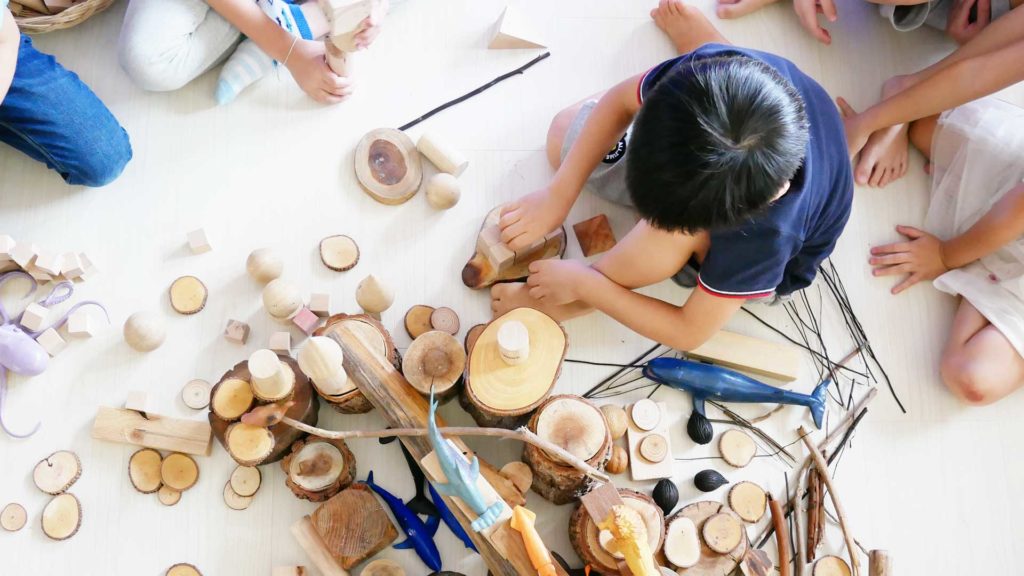Reggio Emilia : The Benefits of Open-Ended Play

We often ask any visitors to our setting to actively watch and listen to groups of children using loose parts in the garden. It is really only when one observes that the abundant benefits of open-ended play shine though.
Language
Whilst we generally don’t encourage interrupting play, asking the children what they are making is beneficial as they will often be using new language and vocabulary. Allowing them to use and practice this language as they work together in a group will also allow shier children the confidence to speak. This language may or may not be related to project work they are currently exploring in class but will definitely give an insight into what interests them at the moment. Valuable information for teachers and parents alike.
Imagination & Creativity
The nature of having a set of toys with no clear use, and no predetermined rules opens the resources up to interpretation. As children become more comfortable and used to playing with them (this may need some adult modeling and inspiration to begin with) they will soon begin to experiment and explore mixing, combining and creating games, activities, art, structures, city-scapes, small worlds on their own.
Concentration & Engagement
Being a setting which has undergone a transition from a reliance on factory made, plastic toys with a single use-case to one where virtually no plastic is available and all resources are open-ended, there is no question that we have seen a huge change in both concentration and engagement levels of children from all ages. With a clear objective in mind children with continue until their goal has been reached. This has huge transferrable benefits when applied to other areas of their lives or study.
Independence & Confidence
Reggio settings will be encouraging independence as much as collaborative activities. Loose parts play, free in its nature, with no right or wrong, allows children to develop their own style, techniques, interests, confident in the knowledge that everything is acceptable. One of the biggest noticeable changes we saw as a nursery when we began following a Reggio approach was the confidence levels of the children. It is on reflection quite obvious that when you remove the possibility ‘failure’, children will feel more relaxed, at ease and will not fear trying new things. Loose parts and open-ended play thus lend themselves perfectly to developing these two life skills.
Dispute Resolution & Collaboration
As with adult groups, working together on activities and tasks with hone collaborative skills which might otherwise be weak. Children from single child families will often find sharing and working together more stressful than those with siblings. Having a shared goal helps to bond a group. There will be arguments and conflict and adult intervention most probably will be needed but over time the children will be able to manage disagreements and overcome group conflicts.
Leadership & Problem Solving
Collaborative play innately brings forth two components; problems and solutions. With a problem to solve and a group ready, there will many solutions put forward to the group. This dynamic will ultimately see the creation of a leader. This doesn’t mean to say that the other children will just fall in line and play a weaker role in the group as the leadership role will be challenged many times over time and will inevitably fall to the most confident at any one time. Children who practice playing with certain materials or manipulating specific tools will become much more secure in knowing the possibilities which exist and the groups capabilities of achieve success in their goal. This natural selection of leaders acts to develop confidence of all group members, with all participants actively seeking to shine by putting forward their plan or design with the hope of attaining the majority vote.
Healthy Balance to Technology
Modern family life often presents an imbalance of technology, not just to children but to all of us. Households will have differing limitations, with some families almost outlawing any tech use whatsoever. Whatever the usage, technology in its nature has a way of infiltrating our lives and and increasing our dependence on it over time. We don’t know the long term effects of the over use of tablets but we do know that it takes immediate time away from playing outside or engaging in anything real and tactile. For this reason alone, if you believe that balance is important in any aspect of life, then encouraging and nurturing a type of play which creates that balance in your child’s life should be viewed as a good thing.
